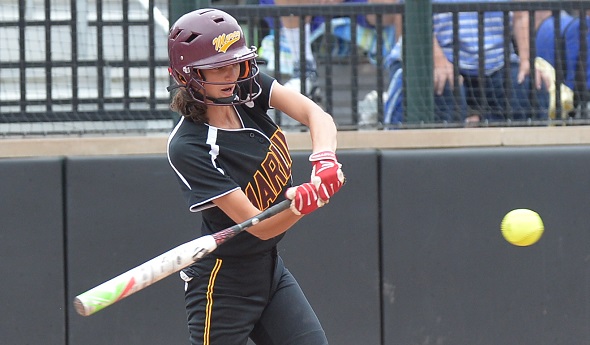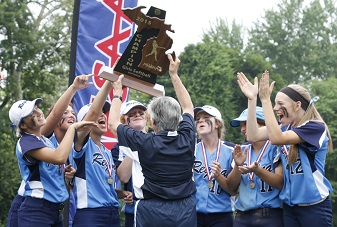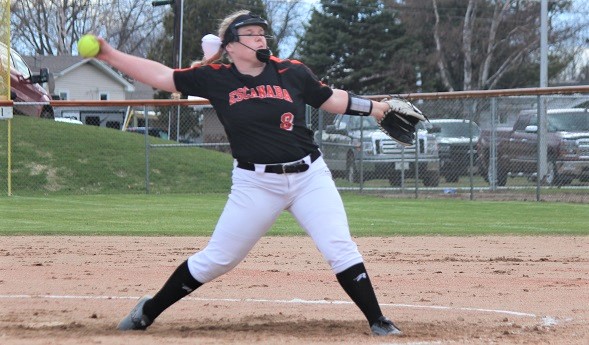
Detroit Powers Succeed Amid Lower Numbers
By
Tom Markowski
Special for Second Half
April 20, 2016
Participation in spring sports, following a similar decline in student-aged population in Michigan, has been on a decline statewide over the last decade.
 But while some like baseball have experienced a slight bounce-back over the last few seasons, softball in particular has seen its numbers continue to fall.
But while some like baseball have experienced a slight bounce-back over the last few seasons, softball in particular has seen its numbers continue to fall.
Coaches and administrators in the Detroit area point to a number of factors intertwined that produced a snowball-like effect – and now it seems to have come to a head.
Three softball programs in the Catholic League Central, a division that competes at a high level statewide, don’t have sufficient numbers to field a junior varsity this spring. Many programs don’t sponsor freshmen teams for the same reason.
But for schools like Birmingham Marian, Farmington Hills Mercy and Livonia Ladywood not to have a junior varsity softball team is quite shocking to some – especially considering that Mercy enters this season ranked No. 3 in Division 1 and Ladywood is No. 2 in Division 2.
Specialization fallout
Marian athletic director Dave Feldman isn’t among those stunned. He saw this coming. Feldman points to the 2007-08 school year when the Michigan High School Athletic Association was forced, by court decision, to switch the volleyball season from the winter to the fall and the girls basketball season from the fall to the winter.
Feldman has a daughter, a freshman at Marian, who participated on the junior varsity volleyball team this fall. When that season was over she joined a club volleyball team. Feldman said the club volleyball season begins in December and continues on into June.
“It’s not AAU,” Feldman said. “But you need to be an AAU member (to play). They play all of the time. Heck, they played on Easter Sunday. And every club is filled.”
The pressure on athletes to play year-round is arguably greater now than it ever has been, and can come from coaches, peers and family – based on a frequent misconception that if athletes want to earn a scholarship, they better keep up with the Joneses or be left behind.
Feldman said he’ll back his daughter with whatever decision she makes. If she wants to play volleyball nine or 10 months a year, he’ll support that. But Feldman said, financially, it’s getting out of hand. He estimated between the cost of airfare, hotels and meals that he’ll spend $6,500 in support of his daughter playing club volleyball.
And, according to Feldman, the increase in attention on volleyball is affecting participation in other sports.
“(Girls) basketball is fighting for its life,” he said. “Our field hockey program (a fall sport) is fine. Our lacrosse teams are fine.
“We have 15 playing volleyball at all three levels. We had 16 (total) try out for softball and we made two cuts. We haven’t had a JV the last two years. The last time we had a freshman (softball) team was in 2004 or 2005. The last few years the numbers have dropped off. It’s the specialization.”
Simply signs of change?
Warren Regina is another member of the Catholic League Central. Regina athletic director Diane Laffey also is the head coach for softball and basketball, and she said she thinks lacrosse has drawn some athletes away from softball – which makes sense, although the total number of girls playing high school lacrosse in Michigan has increased only about 1,000 over the last decade, while softball participation is down 4,000 athletes over the same time.
One should not use Regina as an example of decline – Laffey’s team won the Division 1 championship last spring and fields a softball team at all three levels. At the same time, Regina also has seen a rise in participation in lacrosse. There are 18 playing for both the varsity and junior varsity this spring, the highest participation in school history.
Mercy varsity softball coach Alec Lesko said, simply, that times have changed. Mercy reached the Division 1 Semifinals last season, just as Ladywood did in Division 2 the year before – yet despite this success, Mercy’s number of softball players also has declined.
 “(The students) have many more options,” Lesko said. “In addition to their school work there’s band, theatre, honors society clubs. In the past kids would play three sports and be in the band. All of my daughters were multi-sport athletes. By their sophomore year they had to make a decision (on which sport they would concentrate).
“(The students) have many more options,” Lesko said. “In addition to their school work there’s band, theatre, honors society clubs. In the past kids would play three sports and be in the band. All of my daughters were multi-sport athletes. By their sophomore year they had to make a decision (on which sport they would concentrate).
“It’s also economics. They want to earn a scholarship. You hear horror stories about (the cost of) student loans. Even the big schools have trouble getting the (students to play softball).
“As far as college, and I can only speak about softball, the Big Ten coaches want the player they recruit to play other sports,” Lesko added. “I hope to have a JV program next year. A player that misses 30 JV games, we will feel that crunch later. There are those who think JV softball is a waste of time, that you should just compete in travel (during the summer). We will get some of those kids. Those who compete in travel then come to us as sophomores.”
Reasons for optimism
Don Peters is the softball coach at Clarkston, and between coaching travel and at the high school level he’s put in 35 years. He coached travel before taking over the Clarkston program. Peters said the two complement each another, or at least they should.
“I know some disagree,” he said. “The girls have a lot of choices in the spring. Look at all of the sports they can play. I don’t think lacrosse has cut into the numbers. Not yet, but it’s probably going to. We haven’t been affected. We have 45 (covering three teams) in our program. We really push softball in our community because it’s been established.”
Peters said coaches in softball and baseball need to make the game enjoyable, and one way is to reward those who chose to participate by playing them on a regular basis. A student who is No. 14 or 15 on a squad often will play once a week and, with all of the options available, isn’t willing to put in the practice time for limited game action.
Mercy senior first baseman Abby Krzywiecki played a variety of sports before her freshman year. It was then she decided that softball would be her main sport and she chose to pour all of her energy into it.
She said it’s not all gloom and doom for her sport.
“We had a small freshmen class (last year),” she said. “When I came in we had a large class. It was one of the biggest. It’s not that we’re not getting softball players. In the travel world, it’s becoming more intense. We have more younger people playing. The sport is getting more intense. The talent level is getting higher.”
 Tom Markowski is a columnist and directs website coverage for the State Champs! Sports Network. He previously covered primarily high school sports for the The Detroit News from 1984-2014, focusing on the Detroit area and contributing to statewide coverage of football and basketball. Contact him at [email protected] with story ideas for Oakland, Macomb and Wayne counties.
Tom Markowski is a columnist and directs website coverage for the State Champs! Sports Network. He previously covered primarily high school sports for the The Detroit News from 1984-2014, focusing on the Detroit area and contributing to statewide coverage of football and basketball. Contact him at [email protected] with story ideas for Oakland, Macomb and Wayne counties.
PHOTOS: (Top) A Farmington Hills Mercy hitters prepares to connect during last season's Division 1 Semifinal against Caledonia. (Middle) Warren Regina coach Diane Laffey hoists her team's championship trophy after the Saddlelites downed Caledonia in the Final last spring.

Talented Escanaba Pursuing Title Repeat
May 14, 2019
By Dennis Grall
Special for Second Half
ESCANABA – Ever since softball became part of the Escanaba High School athletic program in 1997, it has been among the best and most consistent offerings in the state.
 Last year the Eskymos confirmed their elite prep status by winning the MHSAA Division 2 title, and they again are in the thick of this year's championship picture. Escanaba belted South Haven 5-0 in last season’s Final, after clipping Eaton Rapids 2-0 in the Semifinal two days before.
Last year the Eskymos confirmed their elite prep status by winning the MHSAA Division 2 title, and they again are in the thick of this year's championship picture. Escanaba belted South Haven 5-0 in last season’s Final, after clipping Eaton Rapids 2-0 in the Semifinal two days before.
The Eskymos won their final 13 games last year to finish 31-3. Gabi Salo, then a sophomore, fanned 11 of the title game's opening 13 batters and allowed three hits while punching out 13 batters total. Salo and Escanaba yielded just two runs over seven postseason games. The six EHS seniors on that team compiled a 131-18 record during their four seasons.
Escanaba previously was Division 1 runner-up in 2003 and lost in Division 2 Semifinals in 2016 and 2017.
Salo has helped the Eskymos to a 15-1 record in this weather-marred spring, and Escanaba was ranked No. 1 in the state before losing to Kent State recruit Gabbie Sherman and Division 3 top-rated Millington 3-0 on Friday in Escanaba. Sherman, another of the state's prime pitchers, also throttled Escanaba 2-1 last year.
The Eskymos rebounded from Friday's loss in grand style on a frigid Saturday, whipping Marshfield, Wis., 9-5 and then clipping arch-rival Gladstone 7-0 behind a perfect game by Salo, who whiffed 14 batters.
Gladstone manager John Nevala said "if her control is good and she can get the corner called, she can be called unhittable. We had been hitting the ball pretty good until we faced Gabi."
Salo demonstrated better location and control against Gladstone than the previous night's rare loss. "She is in a class of her own," said Nevala. "She has to be one of the top pitchers in the state. She had very good movement.
"She has excellent speed (around 64-65 mph) and an excellent changeup. She changes speeds so well. She probably has three different speeds. You can't really dig in on one location at the plate."
This season Salo is 10-1 with two saves and sports a dominating 0.02 ERA. She has struck out 136 batters in 69 2/3 innings, but has also issued eight walks and hit four batters during wicked spring conditions the opening month. (NOTE: After a pair of no-hitters Monday and Tuesday against Marquette and Gladstone, respectively, Salo is 12-1 with 161 strikeouts in just under 84 innings pitched.)
A University of Wisconsin recruit since last spring, Salo felt she threw well against Millington and Gladstone, but indicated she was "pretty tight" in the freezing opener. She said her curveball and changeup worked better against Gladstone.
She didn't pay attention to keeping Gladstone off the bases. "I try not to think about those things. I feel like it is a jinx," she said.
 Salo worked hard last year to develop her back-breaking change-up and now terms it her favorite pitch. "It is spot-on," she said. "It throws the hitters off their game. I go out, focus and attack the hitter. I like getting swinging strikes." She is not afraid to use her change on a 3-2 count.
Salo worked hard last year to develop her back-breaking change-up and now terms it her favorite pitch. "It is spot-on," she said. "It throws the hitters off their game. I go out, focus and attack the hitter. I like getting swinging strikes." She is not afraid to use her change on a 3-2 count.
She fires her fastball down-and-in or inside-and-high and loves to get her pitches inside on the batter's fists.
The Escanaba first-year manager is her father, Gary, who was the pitching coach for the Eskymos last year under Jamie Segorski, who resigned as coach just as practice began this spring. Gary and Gabi have been together for several years on different summer travel teams.
He signals the pitches from his dugout perch, using input from his daughter and junior catcher and Ferris State commit Dakota Cloutier, who also handled that spot last season.
Senior right fielder Lexi Chaillier, a three-sport, four-year standout, leads the Eskymos with a .481 batting average and five home runs. Gabi Salo leads with 18 RBI and hits .378, while sophomore first baseman-pitcher Nicole Kamin is hitting .477 with 14 runs driven in. Cloutier is hitting .356 with 12 RBI.
Expect that quartet to lead the way this weekend when the Eskymos play in a highly-competitive 20-team invitational tournament in Ann Arbor. The strong field is what the Eskymos search for in compiling a schedule, with trips into Wisconsin and lower Michigan to find high-quality opponents.
Referring to other top hurlers, along with Millington's circle ace, Gary Salo said "we want to go up against elite pitching if we want to go to the next level." And now, with a state title, he said the Eskymos know "we are going to get everybody's best game."
After Friday's loss and the twin wins Saturday, the Escanaba skipper said "our kids are very resilient. We licked our wounds."
Much of the high school program's success is credit to a tremendous Little League program. Gabi Salo began pitching at age 10 when her youth coach asked if anyone wanted to throw. For many years she has received extensive coaching from Pat Brower in Ann Arbor. "He has developed Gabi into the pitcher she is," said her dad. "It is well worth driving six-and-a-half hours each way."
 Gabi Salo began her travel ball experience with the Escanaba Heartbreakers at age 10, then joined downstate teams, playing with Wixom Finesse the past three summers. The opportunity to play against quality travel teams in addition to high school has been crucial to her development.
Gabi Salo began her travel ball experience with the Escanaba Heartbreakers at age 10, then joined downstate teams, playing with Wixom Finesse the past three summers. The opportunity to play against quality travel teams in addition to high school has been crucial to her development.
Travel ball has taken the Salos to Atlanta, Huntington Beach, Calif. and Boulder, Colo. in addition to such destinations as the Grand Canyon. Gary Salo drives the family RV everywhere, with just father-daughter on most jaunts.
"Softball has given us a summer-long vacation," said Gary Salo.
"Definitely travel ball has helped me see parts of the country I would never get to see," said Gabi, who plans to enter the nursing field at UW and works at Christian Park Nursing in Escanaba. She also bowled for EHS and participates in dance, saying she would skip a softball game but would not skip a dance recital.
"The travel ball and high school competition is pretty equal," she said. "We play the best competition there is in the country."
Escanaba, which also excels in the classroom (a state-best 3.83 GPA), knows a title repeat will be difficult to achieve because teams like Richmond, Muskegon Oakridge, Eaton Rapids, Spring Lake, Detroit Country Day, Freeland and Stevensville Lakeshore are very dangerous.
"It is not a seven-game series. They are seven-inning games," Gary Salo said of the postseason dynamics.
"A lot of teams are playing really, really well," he said. "Any team has the opportunity to get lucky like we did."
 Denny Grall retired in 2012 after 39 years at the Escanaba Daily Press and four at the Green Bay Press-Gazette, plus 15 months for WLST radio in Escanaba; he served as the Daily Press sports editor from 1970-80 and again from 1984-2012 and currently is in a second stint as the interim in that position. Grall was inducted into the Upper Peninsula Sports Hall of Fame in 2002 and serves as its executive secretary. E-mail him at [email protected] with story ideas for the Upper Peninsula.
Denny Grall retired in 2012 after 39 years at the Escanaba Daily Press and four at the Green Bay Press-Gazette, plus 15 months for WLST radio in Escanaba; he served as the Daily Press sports editor from 1970-80 and again from 1984-2012 and currently is in a second stint as the interim in that position. Grall was inducted into the Upper Peninsula Sports Hall of Fame in 2002 and serves as its executive secretary. E-mail him at [email protected] with story ideas for the Upper Peninsula.
PHOTOS: (Top) Gabi Salo makes her move toward the plate during last weekend’s Escanaba Invitational. (Middle) A championship banner at the Eskymos’ home field celebrates last season’s Division 2 championship. (Below) Gary Salo has taken over the varsity this spring. (Photos by Dennis Grall.)

